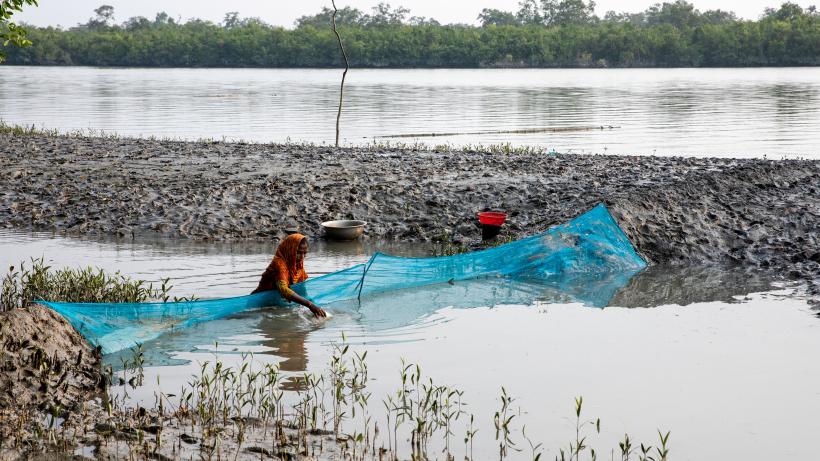
Sustainable fishing and women's labour in the blue economy
Women’s labour in the blue economy is often undocumented, unequally compensated, and more vulnerable to climate shocks. Formalising women’s employment and investing in their education can help improve gender equity and sustainable development outcomes for them and the oceans.
The blue economy is entering a new economic and management paradigm. Almost 200 countries have agreed to the UN’s recent High Seas Treaty to protect 30% of Earth’s total land and coastal marine areas by 2030. The global demand for commercial fishing products is strong, and aquaculture activities are expanding. Women constitute 47% of the people deriving their livelihoods from fishing and 70% from aquaculture and are key stakeholders who can prosper and contribute to the sustainable development of the sector.
Figure 1: Estimated contribution of women to small-scale fisheries output totals US$ 5.6 billion
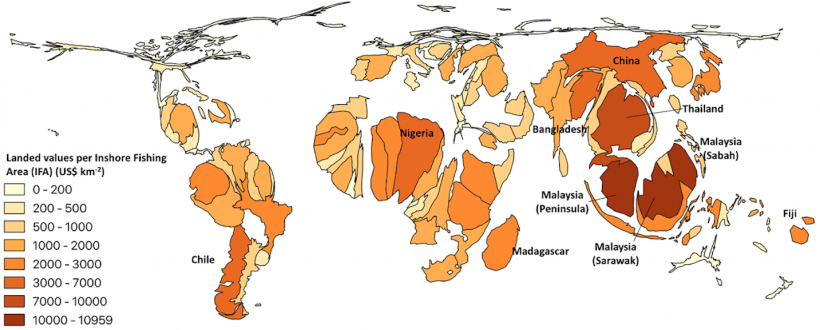
Notes: From estimates on female participation rates by region (and country) in small-scale fishing. Source: Adshade, Harper, Lam, Pauly, and Sumaila (2020).
Women in developing countries provide essential yet invisible labour in fisheries
Women contribute undocumented labour hours to the blue economy, and often depend on it for livelihood-making and family nutrition. Around 40% of those employed or dependent on subsistence in small-scale fisheries are women. It is estimated that 57 million women worldwide derive their livelihoods from capture fisheries alone. Women contribute significantly to paid and unpaid labour in commercial and small-scale fishing–often in jobs that include post-harvest processing, cleaning, and selling.
Figures 2-3: Region-wide employment in aquaculture and fisheries
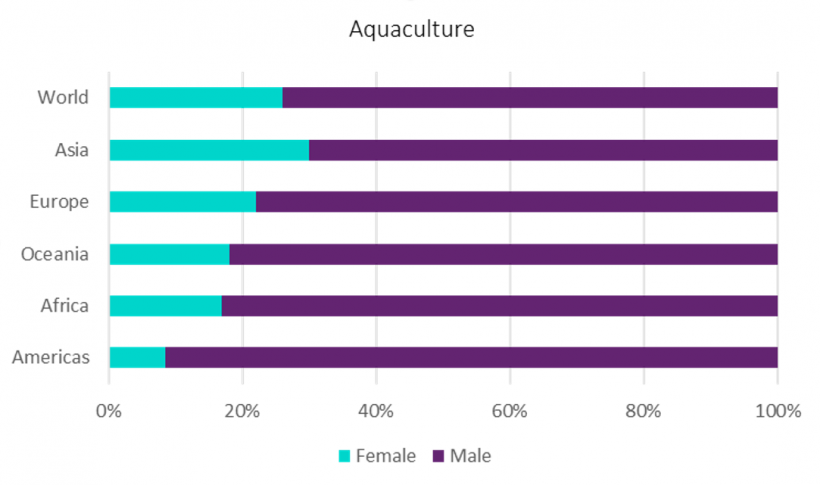
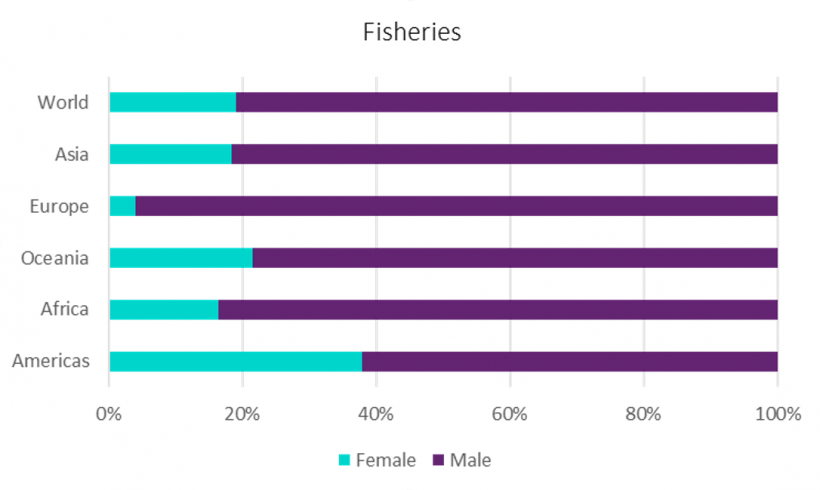
Notes: Sex-disaggregated data on employment in the primary sector of fisheries and aquaculture, by region. Source: FAO (2022).
Women have unequal opportunities in these blue industries because of:
- a lack of access to credit, training, and professional bodies that would increase access and improve conditions of traditional and entrepreneurial roles within the sector
- gender stereotyping which restricts women to lower-paying or non-commercial tasks, primarily in the domicile or post-harvest
- exclusion from the decision-making and governance process of fisheries across management levels
Improving fishery management can create opportunities for women to prosper
Climate change will significantly impact women working across the global blue value chain. Fishing and aquaculture are vulnerable sectors due to the historic depletion of fish stocks above sustainable levels, rising sea levels, ocean warming, salination, and droughts impacting freshwater supplies. Jobs in fisheries are at risk. Women’s work in the sector is often informal, so women are left more exposed to climate shocks and consequently, to job insecurity. They often lack unemployment insurance, credit access, and other business protections. In primarily domestic and informal positions along the value chain, climate change can significantly impact women’s outcomes in the blue economy.
Sustainable management of fisheries and aquaculture is needed to secure long-term direct and indirect employment. It is estimated more than 85% of labourers in the seafood processing sector, both small-scale and industrial, are women. Additional fishing activity, such as the small-scale gathering of fish and crustaceans is considered essential domestic work, performed primarily by women. Negative externalities ranging from stock depletion–when an area is overfished to the point where the stock is unable to regenerate–to congestion in traditional fisheries and decreased water and health quality in aquaculture, will impact the overall health of fisheries. This could damage or deplete the necessary fish and crustacean stock women use to generate income and provide nutrition, leading to poor household outcomes.
Gender equity across the blue value chain can improve the sustainable management of these resources. Maintaining a sustainable harvest ensures stock is not depleted in a season and fishing is profitable across fishery-dependent communities. There is some evidence to suggest that women are more likely to take environmental health and ecosystem impacts into decision-making at the firm and government level. This is driven by women’s role in domestic labour, which often involves acquiring resources for home consumption, and by socialisation. As a group largely dependent on fish as a resource, women’s involvement in decision-making can improve equity in the sector and may improve willingness to create a sustainable management system.
Figure 4: Demand for aquaculture over time
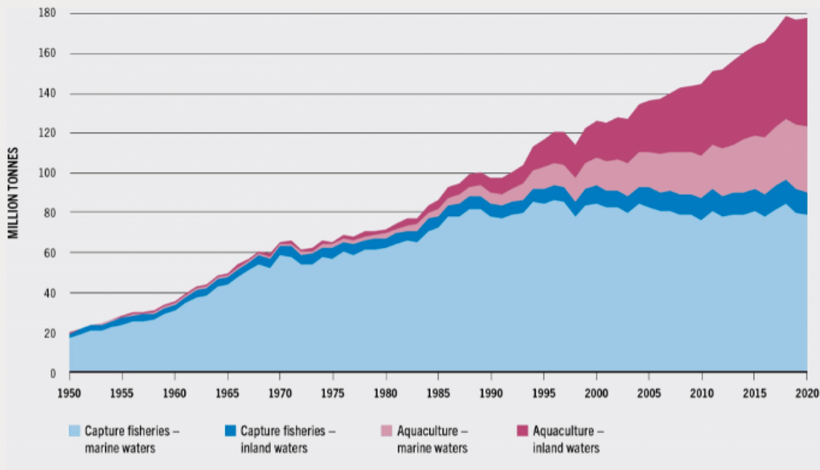
Notes: Demand for aquaculture is growing and has surpassed total catch production in Mt (live weight). Source: FAO (2020).
The High Seas Treaty can help formalise women’s role in the blue economy
On 5 March 2023, the UN reached a historic agreement to protect the open seas. The High Seas Treaty, when ratified, will convert 30% of the open sea into marine protected areas (MPAs), with special provisions for developing economies to receive technology transfers, equitable profits from marine genetic diversity, and greater protection against seabed mining and illegal fishing. If enacted, this legally binding treaty will require both men’s and women’s involvement to deliver the future protection of the open seas, ensuring that women can access equal sustainable fishing and ocean conservation work.
The High Seas Treaty could be an opportunity for women to move into formal roles in the sector. New jobs will be needed in MPA regulation and enforcement, fisheries management, and education. Increased protection of fish stocks could mean more stable populations locally. Moreover, women are reported to be more likely to factor environmental sustainability and ecosystem health into agriculture and fishing decisions. If women have equitable representation in the implementation of this treaty, they will benefit from the formalisation of their work and involvement in decision-making.
How policy can support women in the blue economy
Today, sustainable development policies which successfully implement women’s empowerment in the blue economy are still scarce. Historical evidence demonstrates that when women have political rights, the accumulation of human capital increases and government spending is shifted towards welfare. Women in political leadership roles can lead to improved growth outcomes. Based on this evidence, support for women in the blue economy is needed to contribute to overall growth targets. This can be initiated by:
- collecting more data on women’s contributions across the entire fishing value chain. Clarity on women’s labour participation and value generation allows for robust descriptions of the inequalities in the sector. For example, aquaculture–often considered an effective pro-poor programme–lacks gender-disaggregated data. Therefore, evidence cannot answer whether women share equally in the benefits of the burgeoning industry.
- formalising the blue commodity markets and labour roles. Women with existing industry-specific knowledge can be brought into well-paying jobs. Without formalisation, there are only marginal productivity improvements in processing, selling and handling equipment where women work informally.
- investing in tools and education for women in fisheries to move into entrepreneurial and governance roles can ensure women participate in the management of fisheries and aquaculture farms. Women can create new commodities for export if given the proper training and social support.
Fisheries are essential to women’s work and women are essential to the output of this industry. The sustainable development conversation cannot overlook the importance of this sector. A new approach to managing the world’s oceans needs to have women in roles of governance and be designed to meet the needs of women workers in the blue economy. A strong sustainable development trajectory would equalise women's role through their labour participation, fair pay, and equity in decision-making.
Allegra Saggese also discusses early education and women's participation in the blue economy in this Economist Impact article.

